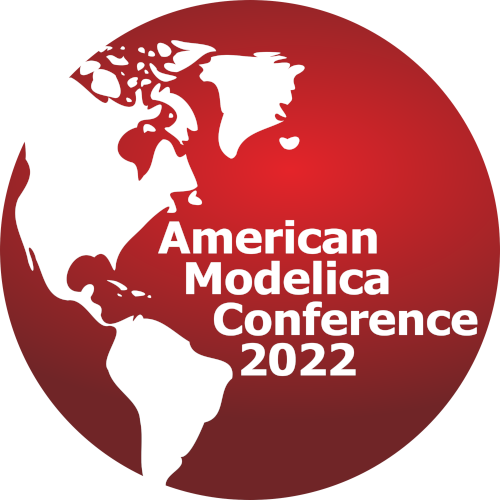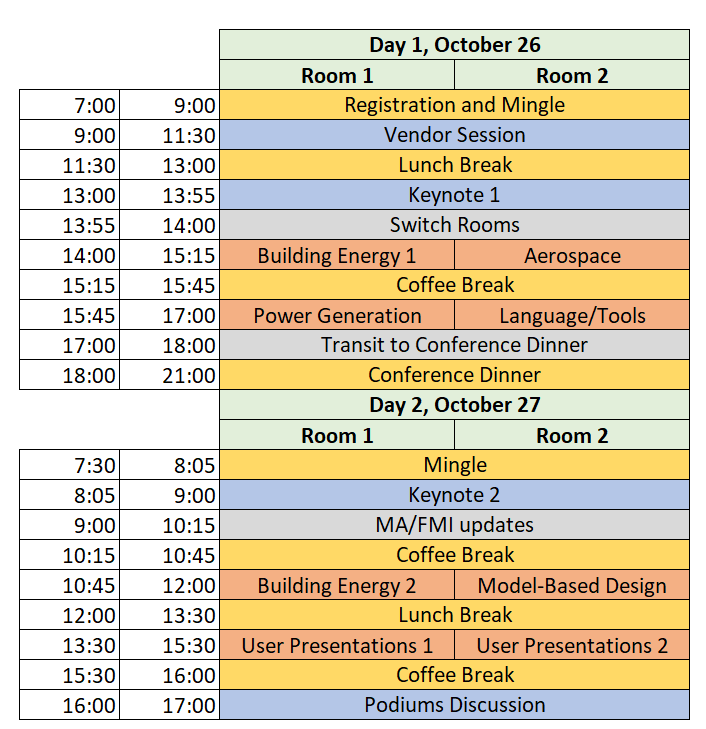
The American
Dallas, October 26-28, 2022
Deadline for submission of industrial user presentations and tutorials extended to July 1st!
Conference Schedule and final program
The conference takes place on Wednesday, October 26th and Thursday, October 27th. The workshops will be held on Friday, October 28th. The time zone for the schedule is CDT, that is US Central and daylight saving time is still on.
Please take a look at the final conference program (pdf).
Program Changes and Updates
Unfortunately we were hit by several unforeseen program changes. Our keynote speaker Swami Gopalswami is unable to come to the conference due to an event outside his control. Our keynote speaker Dirk Zimmer will arrive later than planned due to a cancellation of an international flight. Therefore, we will have the following changes to the printed program:
- Keynote 1 on Wednesday will be given by Scott A. Bortoff, Chief Scientist, Mitsubishi Electric Research Laboratories (MERL). The title of his keynote is “Sustainable HVAC: Research Opportunities for Modelicans”. Please see below for the abstract and speaker bio.
- Keynote 2 on Thursday will be the Keynote by Dr. Dirk Zimmer which was originally scheduled on Wednesday.
We are sorry for the inconveniences this may cause, but these were events outside our control

Keynote 1, Wednesday October 25th.
Scott A. Bortoff Sustainable HVAC: Research Opportunities for Modelicans </br>
Abstract
What are the modeling and control research challenges that, if addressed, will drive meaningful innovation in sustainable building HVAC systems in the next 20 years? In particular, what innovations might help to address the considerable problems with the earth’s climate that are caused by human activity, especially greenhouse gas production? Buildings, as end users of various forms of energy (mainly electricity, natural gas and oil), account for approximately one third of greenhouse gas emissions worldwide, and their HVAC systems are the major energy consumers.
In this talk I will present several ideas and opportunities in the HVAC area that might help to address this sustainability problem. First, at the equipment level, energy-efficient and low GWP HVAC products can be engineered, but present challenges especially related to control. Building envelopes can be designed to produce lower heating and cooling loads, and also to provide integrated power production sufficient to meet HVAC demand, but issues related to storage and intermittent supply remain. HVAC operations can be monitored using ``digital twins’’ that make visible what is otherwise invisible, helping to maintain efficient operation. Yet these technologies are immature and fragile, and challenges remain in designing and maintaining robust operation. Modelica, as a tool for modeling, simulation and analysis of multiphysical, heterogeneous systems, can and will continue to play a major role in developing and maturing new building HVAC technologies, both products and services.
The Modelica community has made significant contributions to this area, through the development of open-source libraries, for example, and should continue to view these urgent problems as opportunities.
Speaker Bio
Scott A. Bortoff is Chief Scientist at Mitsubishi Electric Research Laboratories (MERL), Cambridge, MA, USA. His research interests include mathematical modeling and control of thermofluid systems and mechatronic systems. Prior to joining MERL in 2009, Scott was group leader of Control Technology, at United Technologies Research Center (now Raytheon Technology Research Center), in East Hartford, CT, USA. During his 9.75 year tenure, he lead several projects that used Modelica for system-level dynamic modeling and control design of fuel cell power plants, airborne power generation and distribution systems, and HVAC systems. He held positions of Assistant and Associate Professor of Electrical and Computer Engineering at the University of Toronto from 1992-2000, where he conducted research and taught courses in control. He received the B.S. and M.S. degrees from Syracuse University in 1985 and 1986, respectively, and the Ph.D. degree from the University of Illinois at Urbana-Champaign in 1992, all in Electrical Engineering. He is currently Associate Editor of the IEEE Control System Magazine and serves the Modelica community in various capacities.
Building Energy 1
Wüllhorst, F., Maier, L., Jansen, D., Kühn, L., Hering, D. and Müller, D., BESMod - A Modelica Library providing Building Energy System Modules
Fu, H., Blum, D. and Wetter, M., Fan and Pump Efficiency in Modelica based on the Euler Number
Ma, J., Kim, D., and Braun, J.E., Transient Simulation of an Air-source Heat Pump under Cycling of Frosting and Reverse-cycle Defrosting
Building Energy 2
Firsich, T., Yang, Z., and O’Neill, Z., Development and Validation of a Modelica Model for the Texas A&M Smart and Connected Homes Testbed
Qiao, H., and Laughman, C., Performance Enhancements for Zero-Flow Simulation of Vapor Compression Cycles
Faulkner, C.A., Castellini Jr., J.E., Lou, Y., Zuo, W., Lorenzetti, D.M., and Sohn, M.D., Tradeoffs Between Indoor Air Quality and Sustainability for Indoor Virus Mitigation Strategies in Office Buildings
Aerospace
Reiner, M., Simulation of the on-orbit construction of structural variable modular spacecraft by robots
Podlaski, M., Vanfretti, L., Niemiec, R., and Gandhi, F., Extending a Multicopter Analysis Tool using Modelica and FMI for Integrated eVTOL Aerodynamic and Electrical Drivetrain Design
Coïc, C., Budinger, M., and Delbecq, S., Multirotor drone sizing and trajectory optimization within Modelon Impact
Power Generation
Pham, L.N.H., and Winkler, D., Applying Design of Experiments Method for the Verification of a Hydropower System
del Barrio, I.L., Cestero, J., Quartulli, M., Olaizola, I.G., Aginako, N., and Ugartemendia, J.J., Using Multi-Physics Simulation to Estimate Energy Flexibility for Local Demand Response Strategies in a Microgrid
del Castro Fernandes, M., et al, Power System Real-Time Simulation using Modelica and the FMI
Language/Tools
Tiller, M., A Playground for the Modelica Language
Nachawati, M.O., Bullegas, G., Gregory, J., Vasilyev, A., Pop, A., Elaasar, M., and Asghar, A., Towards an Open Platform for Democratized Model-Based Design and Engineering of Cyber-Physical Systems
Hatledal, L.I., and Fagerhaug, E., Enhancing SSP development using SSPGen
Model-Based Design
Laera, G., et al, Guidelines and Use Cases for Power Systems Dynamic Modeling and Model Verification using Modelica
Paknikar, R., Sharma, N., Nayak, P., Moudgalya, K., and Raman, B., Discretising System-Level Modelling and Simulation Scheduling
Batteh, J., and Gohl, J., Material Production Process Modeling with Automated Modelica Models From IBM Rational Rhapsody
User Presentations 1
Zuo, W. et al., Model-Based Optimization for a Campus District Cooling System
Pan, C., and Li, Y., Hybrid Model Predictive Control of Chiller Plant with Thermal Energy Storage Evaluated with Modelica-Python Co-Simulation
Blum, D., The Use of Modelica and the Functional Mockup Interface for the Building Optimization Testing Framework (BOPTEST)
Phalak, K., and Gupta, D., Use of TRACE 3D Plus Models with Spawn for Rapid Prototype Development in Modelica Environment
Yang, T., Filonenko, K., Zuluaga, I., and Veje, C., Comparative Analysis of Price-based Control Strategies for a High Temperature Thermal Energy Storage System
User Presentations 2
Bortoff, S.A., Modelica-Based Control of a Delta Robot
Ma, Y., Fischer, K., Rackauckas, C., and Shah, V., Prototyping Composable Simplification Passes for Equation-Oriented Models Using ModelingToolkit.jl
Jacob, R., and Zhang, J., Modeling and Control of Nuclear-Renewable Integrated Energy Systems for Electricity and Hydrogen Production
Gavan, V., Chombart, P., Duprat, C., Fricker, J., Radet, B. and Maquin, K., Innovative concepts and application for large scale and multimode systems : use case study of heat networks
Wang, J., Jacob, R., and Zhang, J., Reinforcement Learning based Control of Integrated Energy Systems using ModelicaGym